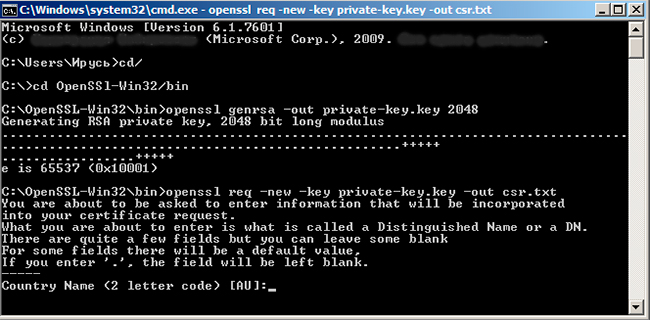Generating A Private Key With Openssl
To perform the following actions for Windows or Linux, you must have OpenSSL installed on your system.
In fact, you set the key size to be 256 bits, and apparently the code is ignoring that/allowing the 192 bit key without an error.Use to derive your AES key rather than a Base64 transformation of a raw string. Powershell generate aes 256 key. Defines PBKDF2 (Password-Based Key Derivation Function 2), an HMAC-based Key Derivation Function to securely derive encryption keys from passwords, and provides for HMAC/SHA1 used with a high number of iterations to mitigate brute-force attacks against your key.You are only invoking TransformFinalBlock on encrypt and decrypt in PowerShell.
- Generating A Private Key With Openssl Key
- Generate Private Key Openssl Linux
- Generating A Private Key With Openssl Download
Reasons for importing keys include wanting to make a backup of a private key (generated keys are non-exportable, for security reasons), or if the private key is provided by an external source. This document will guide you through using the OpenSSL command line tool to generate a key pair which you can then import into a YubiKey.
Generating the Private Key -- WindowsMicrosoft windows 7 key generator online.
In Windows:
1. Open the Command Prompt (Start > Programs > Accessories > Command Prompt).
2. Navigate to the following folder:
C:Program FilesListManagertclwebbincerts
3. Type the following:
openssl genrsa -out rsa.private 1024
4. Press ENTER. The private key is generated and saved in a file named 'rsa.private' located in the same folder.

- Generating Public and Private Keys with openssl.exe To perform the following actions for Windows or Linux, you must have OpenSSL installed on your system. Generating the Private Key - Windows In Windows: 1. Open the Command Prompt (Start Programs Accessories Command Prompt). Navigate to the following folder.
- Mar 03, 2020 openssl ecparam -genkey -name prime256v1 -noout -out ecprivate.pem openssl ec -in ecprivate.pem -pubout -out ecpublic.pem These commands create the following public/private key pair: ecprivate.pem: The private key that must be securely stored on the device and used to sign the authentication JWT.
- Generating 2048 bit DKIM key. Please note that you may want to use a 2048 bit DKIM key - in this case, use the following openssl commands: openssl genrsa -out private.key 2048 openssl rsa -in private.key -pubout -out public.key However, 2048 bit public DKIM key is too long to fit into one single TXT record - which can be up to 255 characters.
- This is a simple doc on generating certificates with OpenSSL. It focus on three different certificate types, exactly the classic RSA and ECDSA and the relative new RSASSA-PSS. It generates a CA and an end entity (EE) certificate for each type. The content is straightforward and concise: Commands.
- Oct 27, 2019 Hence the interest of protecting this private key! The exchanges are initiated and you can navigate. Generating a private key root@osboxes # cd /etc/pki/tls/certs/ root@osboxes certs# make math-linux.key umask 77; /usr/bin/openssl genrsa -aes128 2048 math-linux.key Generating RSA private key, 2048 bit long modulus.
NOTE The number '1024' in the above command indicates the size of the private key. You can choose one of five sizes: 512, 758, 1024, 1536 or 2048 (these numbers represent bits). The larger sizes offer greater security, but this is offset by a penalty in CPU performance. We recommend the best practice size of 1024.
Generating the Public Key -- Windows
1. At the command prompt, type the following:
Generating A Private Key With Openssl Key
openssl rsa -in rsa.private -out rsa.public -pubout -outform PEM
2. Press ENTER. The public key is saved in a file named rsa.public located in the same folder.
Generating the Private Key -- Linux
1. Open the Terminal.

2. Navigate to the folder with the ListManager directory.
3. Type the following:
openssl genrsa -out rsa.private 1024
4. Press ENTER. The private key is generated and saved in a file named 'rsa.private' located in the same folder.
Generating the Public Key -- Linux
1. Open the Terminal.
2. Type the following:
openssl rsa -in rsa.private -out rsa.public -pubout -outform PEM
Generate Private Key Openssl Linux
2. Press ENTER. The public key is saved in a file named rsa.public located in the same folder.